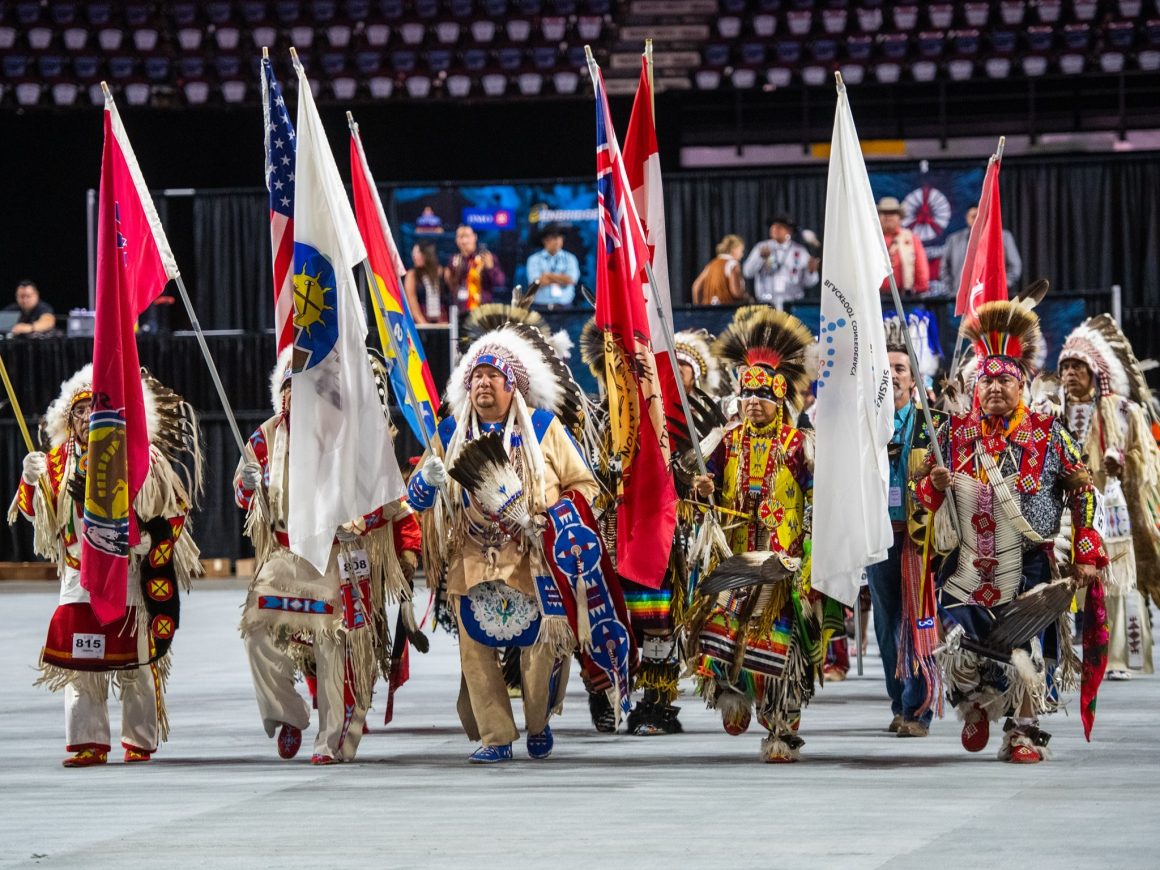
Calgary Stampede powwow and Indigenous cultural traditions
By Kimberly Taylor, July 8 2024—
On July 7 and 8, the Calgary Stampede Powwow will be held from 1–6 p.m. in the Saddledome. The powwow will feature Indigenous dancers from all over Turtle Island (North America) competing in eight styles of dance including Chicken, Grass, Fancy, Jingle, Traditional and Buckskin.
In an interview with the Gauntlet, Jonathon Brewer — specialist of cultural protocols at the University of Calgary’s Office of Indigenous Engagement — spoke about Indigenous cultural traditions around Stampede.
“This is the gathering of dancers from all the different nations. They come from all over Turtle Island, meaning North America. We come together and exhibit our dance styles,” Brewer said. “We each get a chance to compete in our specific categories. It’s just a celebration of being together. And anybody’s invited to these competitions. It is a public event. It’s not a ceremony. It’s a celebration of dance.”
The Indian Act forbade Indigenous peoples from participating in cultural activities. Powwows were adopted by various First Nations all over North America during the 1800’s as a celebration of their culture despite legislation aimed at eliminating their culture. Brewer is a men’s traditional dancer who competed at the Calgary Stampede last year and shared that the powwow historically was off to the side of Stampede until it was recently integrated into Stampede.
Brewer also spoke about the Elbow River Camp at Stampede and encouraged people to visit and engage with the Indigenous artisans and storytellers present.
“[The tipi settlement has] actually been there for a long time. I’ve heard many stories of a lot of different people traveling to this camp and setting up camp. And it’s now an attraction.” Brewer said, “[It] has a lot of storytelling. The elders will have a story time. They also have vendors there too [so] you can purchase things there at the tipi village and take pictures with the tipis. Go visit with the tipi owners. Definitely do take part in the tipi village.”
The Elbow River Camp includes an interpretative program, Bannock booth, powwow demonstration, cultural demonstrations, hand games competitions, and storytelling. The Elbow River Camp is open throughout the Stampede.
Brewer explained that rodeo has often featured Indigenous competitors.
“Since the inauguration of the Calgary Stampede Rodeo back in 1912, that was actually the highlight for a lot of us Indigenous, especially. I’m from Kainai, and a fellow Kainai elder from the past that my dad used to talk about, Tom Three Persons. My dad used to talk about Tom Three Persons when he won the saddle bronc competition.” Brewer said. “We still tell stories about him around campfires. Even going up in the present day whenever an Indigenous person makes an achievement, we’re all watching.”
Brewer also said that Indigenous people have been a part of the Stampede since it began. Currently, Indigenous people are part of various committees with Stampede.
“The Calgary Stampede has always been sort of accepting of the Indigenous people being present, being a part of the parades, part of the rodeo and part of just being there with their settlements. So there’s a lot of things that I find that the Calgary Stampede is very inclusive for the Indigenous people.” Brewer said, “They bring in Indigenous people to be part of the committees, part of the planning.”
Brewer highlighted that there are powwows occurring regularly throughout Alberta that people can attend — along with markets full of Indigenous vendors.
“There are a lot of powwows going on and anyone’s invited to show up and enjoy the dances.” Brewer continued, “There are powwows all over the place at any given time. If you Google powwow calendar, there are powwows that are listed there for all the way across Canada and [the] United States. You just pick one and go and sit down and enjoy. There’s a lot of good vendors if you’re interested in purchasing anything.”
Brewer said that part of the Office of Indigenous Engagement’s mandate is to bridge cultures and to answer questions.
“Don’t be afraid to ask questions. We’re always trying to build that gap and bridge that gap between cultures. And don’t stop asking the questions because, we’re here if you want to come to the Office of Indigenous Engagement. I’m an open book, we are open books, you can ask us anything and if we don’t have the answer we will find an answer for you.”
More information about the powwow can be found on the Stampede website.
